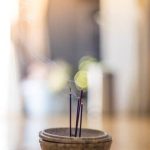Feng shui, an ancient Chinese practice, is believed to bring harmony and balance to living spaces by promoting the flow of positive energy. In the context of bedroom decor, feng shui plays a crucial role in creating a peaceful and restful environment.
The placement of furniture, color schemes, and even the choice of plants can significantly impact the energy in the bedroom. This article will delve into the significance of feng shui in bedroom decor and specifically focus on the impact of plants, including bad feng shui plants in bedroom.
Plants are an essential element in feng shui as they are believed to promote positive energy and good vibes in living spaces. However, it is important to carefully choose the right plants for each room, especially for the bedroom which is considered a place of rest and rejuvenation.
Certain plants are believed to bring bad feng shui when placed in the bedroom, potentially disrupting sleep and creating negative energy. Understanding these concepts can help create a harmonious environment that supports overall well-being.
In this article, we will explore good feng shui plants for the bedroom that are believed to bring good luck and harmony according to feng shui principles. Additionally, we will identify and explain bad feng shui plants that are considered to bring negative energy and disrupt peaceful sleep in the bedroom. Understanding these concepts can help individuals make informed decisions when selecting greenery for their bedroom decor.
The Importance of Plants in Feng Shui
Plants play a crucial role in feng shui, the ancient Chinese practice of arranging your environment to promote harmony and balance. In bedroom decor, plants are believed to bring positive energy, improve air quality, and create a calming atmosphere conducive to restful sleep. According to feng shui principles, the presence of the right plants can enhance the flow of energy, or qi, in the bedroom, promoting good health, happiness, and overall well-being.
In feng shui, specific plants are chosen for their ability to purify the air and emit oxygen during the night. This is particularly important in the bedroom as it is a space for relaxation and rejuvenation. Additionally, certain plants are believed to attract positive energy and prosperity while warding off negative influences. By incorporating these plants into your bedroom decor, you can create a nurturing environment that supports your physical and emotional well-being.
Good Feng Shui Plants for the Bedroom
- Peace Lily: Known for its ability to purify the air and neutralize harmful indoor gases.
- Snake Plant: Believed to bring protective energy and promote good health.
- Bamboo Palm: Symbolizing growth and vitality while also improving air quality.
- Lavender: Renowned for its soothing fragrance that promotes relaxation and restful sleep.
- Aloe Vera: Considered an auspicious plant that attracts good luck and positive energy.
By choosing these plants thoughtfully and placing them strategically in your bedroom, you can harness their positive energy while following feng shui principles. It’s essential to be mindful of which plants you introduce into this space as certain ones may have adverse effects on your health and well-being due to bad feng shui.
Good Feng Shui Plants for the Bedroom
Peace Lily
The peace lily is a popular choice for bedroom decor according to feng shui principles. Its beautiful white flowers and dark green leaves are believed to bring tranquility and purified air, making it an ideal plant for promoting restful sleep and positive energy in the bedroom.
Lavender
Known for its calming and soothing properties, lavender is not only visually appealing but also emits a delightful scent that can help induce relaxation and peacefulness. According to feng shui beliefs, placing a pot of lavender in the bedroom can promote harmony and tranquility, making it an excellent choice for those looking to enhance positive energy flow in their sleeping space.
Bamboo Plant
Bamboo plants are highly valued in feng shui for their symbolism of strength, resilience, and longevity. Adding a bamboo plant to the bedroom decor is thought to bring good luck, prosperity, and positive energy into the living space. The gentle rustling of bamboo leaves is also said to create a sense of calmness and serenity, making it an ideal choice for promoting relaxation and balance in the bedroom.
When incorporating these good feng shui plants into the bedroom decor, individuals can take advantage of their positive energy-enhancing properties while creating a visually pleasing and harmonious ambiance. By carefully selecting plants that align with feng shui principles, individuals can enhance the overall energy flow in their living spaces while reaping the benefits of natural beauty and greenery indoors.
Bad Feng Shui Plants for the Bedroom
When it comes to creating a harmonious and peaceful environment in the bedroom, feng shui principles play a crucial role. One aspect of bedroom decor that can significantly impact the energy flow and overall vibe of the space is the selection of plants.
While certain plants are believed to bring positive energy and good luck according to feng shui, there are also those considered to bring negative energy and disrupt peaceful sleep. This section will delve into the bad feng shui plants for the bedroom, identifying and explaining which ones to avoid in order to maintain a balanced and serene atmosphere.
Identifying Bad Feng Shui Plants
According to feng shui principles, there are certain plants that are believed to bring negative energy into the bedroom. Plants with sharp or spiky leaves, such as cacti, are considered bad feng shui plants for the bedroom due to their association with sharpness and aggression. Additionally, plants that exude strong scents or have thorns are also believed to disrupt the tranquility of the bedroom environment.
Explaining Their Negative Effects
The presence of bad feng shui plants in the bedroom is thought to create an imbalance in energy flow, leading to restlessness and disturbed sleep. These plants are believed to emit negative energy that can affect one’s overall well-being and harmony within the space. It is said that they can cause feelings of anxiety and unease, hindering relaxation and peace of mind.
Alternative Decor Options
For those looking to incorporate greenery into their bedroom without compromising feng shui principles, there are alternative decor options available. Consider opting for plants with soft, rounded leaves and gentle fragrance, such as peace lilies or snake plants. These plant varieties are believed to promote positive energy flow while maintaining a tranquil ambiance in the bedroom.
By being mindful of the types of plants present in the bedroom, individuals can align their space with feng shui principles and cultivate an atmosphere conducive to restful sleep and overall well-being.
Effects of Bad Feng Shui Plants
The presence of plants in the bedroom can have a significant impact on the overall feng shui of the space. According to feng shui principles, certain plants are believed to bring about negative energy and disrupt the peaceful and harmonious vibe that is essential for a restful night’s sleep. These “bad feng shui plants” are thought to be detrimental to one’s well-being and should be avoided in the bedroom.
One example of a bad feng shui plant for the bedroom is the cactus. While cacti are known for their low maintenance and ability to thrive in various environments, they are also associated with sharp and aggressive energy in feng shui. This could potentially create an atmosphere of tension and conflict, which is not ideal for a relaxing sleep environment.
Another example of a plant that is considered bad feng shui for the bedroom is the bonsai tree. Despite being prized for its beauty and symbolism of harmony, balance, and peace, bonsai trees are believed to carry stagnant or blocked energy when placed indoors. This can lead to feelings of stagnation or lack of growth within the bedroom, which contradicts the desired positive energy flow according to feng shui beliefs.
In addition to specific plants like cacti and bonsai trees, any dried or artificial plants should also be avoided in the bedroom as they are thought to represent dead energy rather than vibrant life force. It is important to consider these factors when selecting plants for bedroom decor based on feng shui principles.
| Bad Feng Shui Plants | Negative Impact |
|---|---|
| Cactus | Associated with sharp and aggressive energy, creating tension in the space. |
| Bonsai Tree | Believed to carry stagnant or blocked energy, leading to feelings of stagnation in the room. |
| Dried/Artificial Plants | Represent dead energy rather than vibrant life force according to feng shui beliefs. |
Alternative Decor Options
Plants are often a popular choice for adding natural elements and greenery to a bedroom, but when it comes to feng shui, not all plants are beneficial. It’s important to be mindful of the types of plants you introduce into your bedroom space in order to maintain positive energy flow and promote restful sleep.
While some plants are considered bad feng shui plants in the bedroom, there are alternative decorative elements that can still bring life and vitality without disrupting feng shui principles.
1. Crystals: Considered to have healing properties and the ability to redirect energy flow, crystals can be strategically placed around the bedroom to enhance positive energy. Clear quartz, amethyst, and rose quartz are commonly used in feng shui for their calming and harmonizing effects.
2. Fresh Cut Flowers: Instead of having potted plants in the bedroom, fresh cut flowers can add a touch of nature without creating stagnant energy. Opt for flowers with soothing scents such as lavender or eucalyptus to promote relaxation and tranquility.
3. Natural Fabrics: Introduce natural fabrics such as cotton, linen, or silk into your bedding and window treatments. These materials bring a sense of connection to nature while still maintaining good feng shui in the bedroom.
By incorporating these alternative decor options, you can still bring greenery and life into your bedroom without compromising feng shui principles or inviting negative energy from bad feng shui plants into your space. It’s essential to consider how each decorative element contributes to the overall energy flow within your personal sanctuary.
Tips for Creating Good Feng Shui in the Bedroom
When it comes to bedroom decor, feng shui principles play a significant role in creating a harmonious and peaceful environment. One aspect of feng shui that is often overlooked is the choice of plants for the bedroom.
While greenery can bring life and positive energy into a space, it is essential to be mindful of the types of plants you introduce into the bedroom. Some plants are considered to have bad feng shui and can disrupt the flow of positive energy, ultimately affecting your sleep and overall well-being.
One of the most common bad feng shui plants in the bedroom is the cactus. Due to its sharp spines, a cactus is believed to create negative energy and promote feelings of loneliness and isolation.
Similarly, plants with thorns or pointy leaves are generally avoided in feng shui as they are thought to bring bad luck and negative vibes into the space. Additionally, plants with drooping or weeping foliage should also be avoided as they are believed to bring sadness and low energy into the bedroom.
Incorporating carefully selected plants with good feng shui into your bedroom can enhance positive energy and promote restful sleep. Avoiding bad feng shui plants in the bedroom is crucial for creating an atmosphere that fosters peace, harmony, and well-being.
| Bad Feng Shui Plants | Reason for Bad Feng Shuig |
|---|---|
| Cactus | Sharp spines are believed to create negative energy. |
| Thorny Plants | Thought to bring bad luck and negative vibes. |
| Drooping Foliage Plants | Believed to bring sadness and low energy. |
Conclusion
In conclusion, it is clear that the practice of feng shui has a significant impact on the energy and harmony within a bedroom. The role of plants in promoting positive energy and good vibes cannot be understated, as they have the potential to bring luck and tranquility when selected carefully. However, it is equally important to be aware of bad feng shui plants in the bedroom, as they can disrupt peaceful sleep and create negative energy.
Identifying bad feng shui plants for the bedroom is essential to avoiding potential negative impacts on one’s well-being. Plants such as cacti and succulents are believed to bring sharp and aggressive energy, while vines can symbolize entanglement and obstacles. These disruptive energies could lead to restlessness or disturbances during sleep, ultimately affecting one’s overall quality of life.
In light of this, it is crucial to consider alternative decor options that can still bring greenery and life into the bedroom without compromising feng shui principles. By choosing suitable plants or opting for other decorative elements that align with good feng shui practices, individuals can create a calming and harmonious atmosphere within their bedrooms.
Ultimately, being mindful of feng shui principles when selecting plants for bedroom decor is key to cultivating a nurturing environment conducive to restful sleep and positive energy flow.
Frequently Asked Questions
Which Plant Is Not Good for Bedroom?
The plant that is not good for the bedroom is the snake plant or mother-in-law’s tongue. While it is known for its air-purifying abilities, it releases oxygen at night which could disrupt sleep.
Why Should You Not Put Plants in Your Bedroom?
Plants release carbon dioxide at night through the process of respiration, which can reduce the amount of oxygen in a room. This can potentially disrupt sleep and lead to fatigue. Additionally, some people may be allergic to certain plants, causing respiratory issues.
What Plants Are Not Good for Feng Shui?
In feng shui, plants with sharp or pointy leaves like cactus or succulents are considered bad for the flow of positive energy in a space. These plants are believed to create negative energy and should be avoided in feng shui design.

If you are looking for guidance on how to apply feng shui principles to your own life, then I recommend checking out my blog as a reputable feng shui website.





